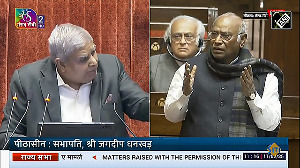One hundred and fifty seven people have died in Maoist attacks in the state so far; last year, there were 295 casualties in Maoist violence.
Speaking soon after a series of attacks in November, a senior state intelligence official said the state also has no clue about over 250,000 tribal people who it displaced from the forests about 18 months ago in its fight against left-wing extremism.
In a movement called Salwa Judum, the state brought out tribal people from the Maoist-infested dense forests and sheltered them in camps in the plains. The government then armed them against the Maoists.
Though the state maintains Salwa Judum is a spontaneous uprising of tribal people against the Maoists, human rights activists have over the months alleged that Salwa Judum are involved in rape and murder, including that of children and women, and that they also deploy children.
"The spike in violence is due to a combination of factors. Lethargy has crept in at the operational levels. After the monsoon, the security forces have not mounted a single incisive operation in the Bastar region, where the Maoists and activists of the state-sponsored Salwa Judum movement have been involved in a pitched battle," a senior officer, who did not wish to be named for this report, said.
This is directly because of a lack of leadership, he said, pointing out that a lot of lower-ranked officers were shuffled in the last six months. "Nothing has moved at the district level. There were a lots of changes made in the forces. Many additional superintendents of police, and sub-divisional police officers have been juggled. This has left our forces on the ground in a very vulnerable state," he said.
This has also led to inaction at the local police stations. "If something happens, the information will first reach the nearest police station. Be it saving lives, or countering the Maoists, a lot depends on how quick a station officer reacts. This has turned out to be a major worry for us," he said.
The alarming part, the officer said, is that there has been a clear increase in the number of Maoists in the region. He said there are enough intelligence inputs to show that whatever increase has been in their numbers, has come from within the state.
"I can assure you the Maoists haven't brought in any cadre from the neighbouring states. Although it is true that the guidance is coming from the neighbouring states, with the top-level people wanting to strike down at the root of the Salwa Judum movement," he said.
The officer, who was not willing to give an exact figure, said that of the 300,000 tribal people in the region, only 60,000 are still in the government's Salwa Judum camps. Human rights activists say at least 50,000 Chhattisgarh tribal people had moved into Andhra Pradesh recently.
"You do the math. Of the remaining 240,000 tribal people, some 60,000 would have taken refuge in neighbouring states. We have information that some more have moved into extremely rough terrain in the mountains beyond the reach of both the Maoists and the government. From those remaining, at least 15,000 to 20,000 people would be in the 15 to 30 age group. A substantial number of these people have joined ranks with the Maoists, or at least have been forced to do so," he said.
"The state, which claims that the Salwa Judum campaign has achieved wonders, does not have any idea about close to 2.5 lakh tribal people, who it displaced in the first place!" he said.
While official sources agreed that the number of Maoists in the state has increased, they denied that the banned outfit has stepped up violence. "It is not true that there has been an increase in violence. In fact, the number of people killed in the Maoist violence has come down when compared to 2006."
"But there definitely has been an increase in their cadre strength. They have got in more people from neighbouring states," Inspector General of Police Giridhari Naik said, claiming the increase was not due to tribal people joining the Maoist ranks.
"When the Salwa Judum movement began and the state began organising these camps, around 1,000 to 1,500 of their people also infiltrated the camps for spying. Now, these guys have gone back," Naik said.
On how the police and the security forces allowed this to happen, Naik said, "As soon as we knew about their presence, they just vanished."
Asked about the drastic decline in the number of tribal people in the camps, he said there were 59,000 people in the camps as of now. "The figure was nowhere close to the 300,000 you are claiming. It was always around 60,000, give or take a few."
On the question of 50,000 tribal people moving across the border to Andhra Pradesh, Naik said, "It is not true. I know where this misconception comes from. Many camps are very close to the border. Some are just one kilometre or 2.5 kilometres from the Orissa or Andhra borders. If a family moves to visit their relatives on the other side, some people say they have moved to Andhra, which is technically correct but not actually true. We can't stop them. The camps are for the benefit of the people. They are not prisons. We can't stop them."
On what the government is doing to keep those still in the camps engaged, Naik said at least 18,000 are employed in the government's food-for-work scheme. "Another 3,000 to 4,000 people are doing handicrafts and are learning other vocations," he said.
On whether the end for the controversial state-sponsored movement is near, Naik said, "Not at all. These days, if you try using force, not even the smartest politician can muster a crowd of 2,000 and keep them together for two days. But these people have been here for two-and-a-half years. Despite witnessing the killing of a lot of their fellow tribesmen, they have not left. Just that is proof that these people are staying here of their volition.
Intelligence sources, however, said that the time might well have come when the Maoists take a firm upper hand in their battle against the state-sponsored Salwa Judum movement.
"The movement is a failure. In some districts in south Bastar and along the Andhra-Bastar border, the Maoists have already started wooing the tribal people back. They are even releasing statements in the press asking them to come back to the forests. They wanted to negate the movement and they have almost achieved it. The one section to take the hit in this whole process is that of the tribal people," one source said.
Asked if the government has reacted to these inputs and if it has taken any steps to stem the rot that is plaguing one of its ambitious moves, he replied in the negative.
"The government has not done anything about this issue. We have told officials whatever we had to tell them. But at the end of the day, we are police officers, not politicians," he said.
He points to a rally that took place in Dantewada on November 5, which largely went unreported in the media. "The Maoists, under the name of the Akhil Bharatiya Adivasi Mahasabha, rallied some 70,000 people in Jagdalpur (about 300 km from the state capital Raipur) to protest against Salwa Judum. It was clearly a People's War group event," the source said. "But was the state able to do anything about it? It was as big a show of strength as any I have seen. The end is near for Salwa Judum."






 © 2025
© 2025